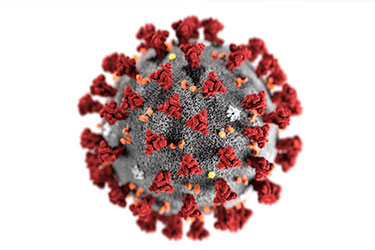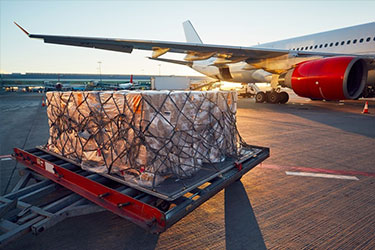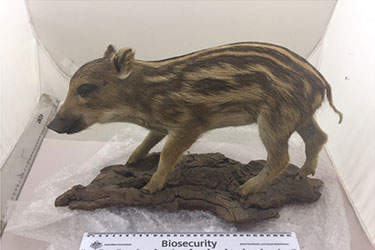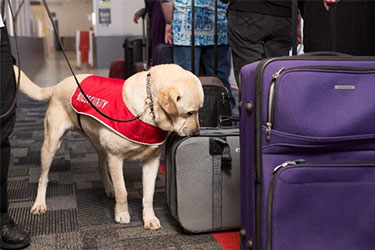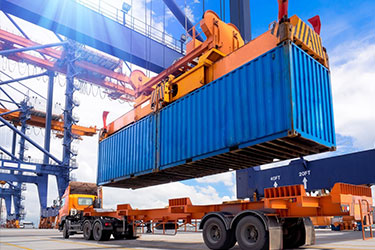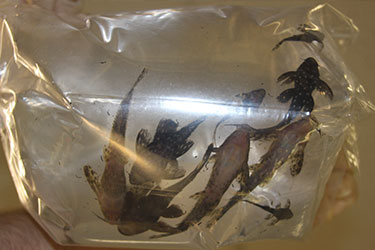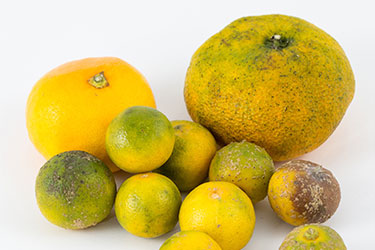Biosecurity is the management of the risk of pests and diseases entering, emerging, establishing or spreading in Australia and causing harm to animals, plants or human health, the economy, the environment and the community.
Biosecurity Matters – what matters to you?
Provide feedback on Biosecurity Matters and let us know what you think.
It’s that time of the year again, and we need your help.
We are completing an annual review of our Biosecurity Matters e-newsletter. You can help us by filling out this 5-minute survey. Tell us what you love about the newsletter and what you think we can improve on.
This will help us ensure our e-newsletter is meeting your information needs and expectations.
Submit your feedback by 7 June 2020.
Be biosecurity aware when buying goods from overseas
Don’t get caught up shopping online before checking biosecurity.
With many of us spending more time at home, you may be considering shopping online. Before you click ‘checkout’ on that next online purchase though, make sure you think about biosecurity and the potential risks associated with some goods purchased online from overseas.
The department is preparing for a significant increase in international mail as a result of COVID-19.
Australia has strict conditions for the import of certain goods, including those purchased online. Some products require an import permit and others simply may not be permitted.
If you are considering buying goods online, ensure those goods can meet import conditions and are permitted, you are confident about their origin and the seller is reliable.
Continue reading about be biosecurity aware when buying goods from overseas
Items such as food, plants, seeds, meat and pet treats can be considered a biosecurity risk and may be intercepted and destroyed if they arrive at our mail centres.
These products can carry serious diseases such as African swine fever or citrus canker, which would devastate our pork or citrus industries.
The same rules apply if you are expecting to receive gifts or other goods in the mail from family and friends overseas, so make sure you pass the message on.
Biosecurity officers, detector dogs and X-ray machines are in place at international mail centres to inspect incoming parcels. If you are found to breach Australia’s biosecurity conditions when purchasing goods from overseas, you may be subject to an investigation and possible criminal prosecution.
This is a challenging time, but by keeping these things in mind you can avoid wasting money and do your part to support Australia’s biosecurity.
Learn more about buying goods online from outside Australia.
Coronavirus (COVID-19) measures and advice
Keeping up to date on Coronavirus and agriculture.
The Department of Agriculture, Water and the Environment is working hard to keep our agriculture, fishery and forestry industries strong and protect our natural environment during the COVID-19 outbreak.
The department has created a dedicated Coronavirus (COVID-19) information hub to provide information about the impacts of COVID-19 on agriculture, trade and the environment. Making it easy for landholders, exporters, importers and travellers to find the information they need online.
The hub covers topics like food safety, environment permits and industry support.
The Australian Government is working to ensure production, supply chains and access to labour continues. This includes funding international freight routes to help exporters get their high-value products into key overseas markets.
Continue reading about Coronavirus (COVID-19) measures and advice
Feeding our nation is an essential service, and we want to ensure high-quality produce can continue to reach domestic and overseas markets. Likewise, continuing to protect our natural resources is imperative.
Environmental regulation is also continuing, while managing the health and safety of our staff and stakeholders. This includes providing information for landholders to ensure they continue to meet conditions attached to Environment Protection and Biodiversity Conservation Act 1999 approvals or Environment Protection (Sea Dumping) Act 1981 permits.
Keep up to date with the latest information on COVID-19 and the work the department is doing.
Securing international airfreight access for Australian agricultural and fisheries exporter
The Australian Government is supporting agricultural and fishery exports during the COVID-19 outbreak.
The agricultural and fisheries sector will receive a helping hand with a $110 million International Freight Assistance Mechanism to assist exports of high-value produce access airfreight to key overseas markets.
In addition, around $10 million in Australian Fisheries Management Authority (AFMA) levies will also be waived for all Commonwealth fishers for the remainder of 2020.
The International Freight Assistance Mechanism will initially focus on the key markets of China, Hong Kong, Singapore, Japan, and the Middle East, with 4 key departure hubs: Melbourne, Sydney, Brisbane and Perth.
Exporters of traditionally airfreighted high-value agriculture and fisheries products are encouraged to complete an online form expressing their interest in the Mechanism. The exporter details provided will also inform decisions for possible expansion of the Mechanism beyond the initial departure and destination ports.
The initiative is part of the Government’s $1 billion Relief and Recovery Fund to support regions, communities and industry sectors that have been disproportionately affected by COVID-19.
See who is eligible and how to register interest.
Never a boaring day in biosecurity
Taxidermy piglet.
Our biosecurity officers had a crackling week earlier in the year, with multiple finds that posed significant threats to Australia’s biodiversity, biosecurity and food security if undetected.
One of the more unique finds was a package inspected at the Sydney mail centre. The package was declared as an ‘Antiquity'. On inspection, biosecurity officers found a taxidermy piglet mounted on a driftwood base.
Paperwork was not supplied to verify the level of processing or the taxidermy method, or the country that the piglet was originally from. There was also evidence of borer activity and dead insects on the body.
The pig presented a biosecurity risk for African swine fever (ASF) among other things. ASF is a deadly pig virus that would decimate our pork industry.
This virus has already established itself in Asia and parts of Europe and continues to spread. There is no vaccine and it kills about 80 per cent of pigs it infects. ASF is not present in Australia and we are doing our best to keep it that way.
To reduce the biosecurity risk, the item was treated at the importers expense and released.
Learn more about ASF and how you can help keep it out of Australia.
Our hero detector dogs make life ruff for invading pests and diseases
Our dogs always put their best paw forward.
What has 172 paws, 43 noses, and spent all of 2019 sniffing out biosecurity risk material in return for bellyrubs and treats? Australia’s pack of dedicated biosecurity detector dogs.
Just under 4 dozen Labradors, our fluffiest cohort of pawblic servants, work across our airports, sea ports and international mail centres. They uncover biosecurity risk items and protect our agricultural industries on a daily basis.
Head of biosecurity Lyn O’Connell said that every agricultural business in the country has these dogs and their handlers to thank for intercepting biosecurity risks that could devastate our food production if they went undetected.
‘In 2019 the detector dogs intercepted more than 56,000 biosecurity risk items. Meat, fruit and seeds are the most common items they find,’ Ms O’Connell said.
Continue reading about our hero detector dogs make life ruff for invading pests and diseases
‘Almost half of the meat products they detected last year were pork. Pork products have the potential to bring African swine fever into Australia. This would absolutely decimate pig farms, like we’ve seen across much of the rest of the world.
‘Even one person bringing pork in with the intention to eat it could put a few scraps in the garbage, which could be eaten at a landfill site by feral pigs, which could spread the disease to farms. It’s like a small pebble creating ripples across a pond.’
Undeclared pork products detected by our dogs have resulted in visa cancellations for travellers from overseas.
‘People seeking to skirt our biosecurity laws when entering Australia will face huge consequences if they’re sniffed out,’ Ms O’Connell said.
The department is exploring ways to modernise our detector dog fleet, to respond to seasonal and emerging biosecurity risks.
‘Our dogs are very intelligent and can be trained to detect very specific things,’ Ms O’Connell said.
‘For instance, we’re trialling a program to detect brown marmorated stink bugs hiding out in the bodies of imported cars.
‘These nasty bugs are a significant horticultural pest. They’re known to feed on over 300 host species, including much of the food grown in Australia.’
Meet some of our dogs and find out more about them.
Trialling innovative technology to stop hitchhiking pests
New technology may improve hitchhiker pest detection.
Two technology companies – Trellis Data and Industry Spec Drones (ISD) – have each been awarded $1 million under the Business Research Innovation Initiative (BRII). They will each develop a proof of concept to improve detection of hitchhiker pests and contaminants in or on shipping containers entering Australia.
Head of biosecurity for the Department of Agriculture, Water and the Environment, Lyn O’Connell, said that innovative biosecurity practices help protect our agricultural industries, environment and the economy.
‘Finding effective solutions for this challenge will help us manage the increasing amount of goods crossing our border.’ Ms O’Connell said.
Trellis Data is looking at ways to automatically detect high-risk containers and determine what pests and other contaminants may be inside. They are exploring options such as artificial intelligence and multi-sensors on cranes for mass screening.
Continue reading about trialling innovative technology to stop hitchhiking pests
They will use their Biosecurity Automated Threat Detection System (BATDS) to detect and document biosecurity threats using computer ‘vision’, including microwave and other wavelengths.
Once operational, the system will hopefully have the ability to detect pests in real-time during container inspections. It will also send a message to biosecurity officers to set aside containers for manual inspection.
ISD are working on a project to use their Bioscan application to identify organic materials on shipping containers using various wavelengths of light.
They are hoping to demonstrate the ability to detect pests and other contaminants by using handheld devices, unmanned aerial vehicles and fixed autonomous devices at key choke points – such as ship-to-shore cranes.
‘Inspecting containers can be challenging, time-consuming and costly. Right now, inspections rely on visual risk identification at the first pass.
‘We are always looking for innovative and cost-effective solutions to improve the detection and management of pests and contaminants on or in shipping containers.
‘We are keen to explore all possible alternates to physical inspection, including new technologies and computer algorithms.’ Ms O’Connell said.
The BRII offers small and medium enterprises the opportunity to receive up to $1 million to test innovative ideas, retain their intellectual property and commercialise their ideas.
See the full list of grant recipients.
Fish smugglers schooled at Melbourne Airport
Fish intercepted at Melbourne airport, smuggled in plastic bags.
There was something fishy at Melbourne International Airport when biosecurity officers intercepted 2 passengers attempting to smuggle 122 live fish into Australia.
Head of biosecurity Lyn O’Connell said the seizure was a joint effort between the Department of Agriculture, Water and the Environment and the Australian Border Force (ABF).
‘As part of an intelligence-led operation, the 2 passengers were selected for a baggage inspection when they arrived at Melbourne Airport.
‘The passengers did not declare the live fish, they were discovered in a number of plastic bags that were filled with water and concealed in their checked-in baggage.
‘Live fish can carry and transmit parasites, bacteria and viruses that could affect our native aquatic wildlife and destroy our $3 billion fishing and aquaculture industries.
‘They may also be considered a biosecurity pest and be damaging to our unique aquatic environments and ecosystems.’
Continue reading about fish smugglers schooled at Melbourne Airport
Illegally importing wildlife is also cruel — smuggled animals can suffer stress, dehydration or starvation and many animals die during transit.
Live fish may be imported for the aquarium (ornamental) trade or for laboratory research, but importers must meet the requirements.
Penalties for smuggling wildlife include fines and imprisonment, depending on the offence.
Find out more about how you can report illegal wildlife smuggling activities.
Don’t let citrus canker turn things sour for Australia’s citrus industry
Citrus canker is a bacterial disease that causes wart-like brown spots on fruit and leaves.
Have you ever spotted a warty lemon or lime in your local grocery store? Australia’s hundred million-dollar citrus industry hopes you never will.
Industry and the Australian government are working together to keep our country free of a bacterial plant pathogen that has the potential to devastate horticulture businesses. A detection of citrus canker in the Northern Territory and Western Australia in 2018 has been under a joint eradication program to prevent its spread to citrus growing areas. Eradication has been successful in Western Australia and the eradication is now in the final stages in the Northern Territory.
Citrus canker is a bacterial disease that causes wart-like brown spots on fruit and leaves. It makes fruit inedible and damages the trees that many species, such as lemons, limes, oranges and grapefruit, grow on.
It also can affect many native species. So it poses an equal threat to our agricultural industry and our environment.
Continue reading about don’t let citrus canker turn things sour for Australia’s citrus industry
Head of Biosecurity Lyn O’Connell spoke of the importance of protecting plant life in Australia from foreign pests and diseases.
‘Our native plant life is part of what defines Australia and makes it unique, and the agricultural plants we grow feed not only our own citizens but many people around the world as well,’ Ms O’Connell said.
‘2020 is the United Nations International Year of Plant Health, which is an opportunity for all Australians to learn about how important keeping our agriculture and environment healthy is.
‘In a year when we’re all thinking about protecting human health, we can’t lose sight of also protecting the plant species we rely on for food.’
And it’s biosecurity officers on the front line at airports and other points of entry who intercept infected fruit and thwart potential outbreaks.
In the past few months, several passengers arrived in Australia with fruit or fruit products that were infected with citrus canker.
The bacteria can live in dried fruit as well as fresh fruit, so it’s not just whole pieces of fruit that our officers look for.
Luckily, each passenger declared the fruit they were carrying, and the items were destroyed.
But the infected items were only a few of the 12,000 citrus items intercepted in our international airports over the last year. Because so much is brought in, passengers are asked unilaterally to declare any food product they might have.
‘The danger comes when people deliberately try to bring animal and plant products in without declaring them,’ Ms O’Connell said.
‘When overseas travel resumes, we ask that people remember their obligations to fill out their incoming passenger cards correctly.
‘People flaunting the rules will find they are subject to hefty fines and prosecution—and for visitors to Australia, they could have their entry visa cancelled.’
Read more about travelling or returning to Australia from overseas.
Read more about the International Year of Plant Health.
See the latest Import industry advice notices or Export industry and market access notices.



